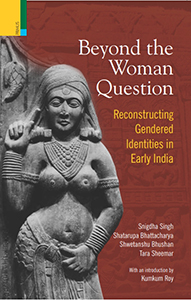
Beyond the Woman Question: Reconstructing Gendered Identities in Early India
EDITOR- Kukum Roy
| HB ₹895 . $44.95 . ₤36.95 |
||
INFORMATION
- EDITOR : Kukum Roy
- HB ISBN : 978-93-84092-77-1
- Year : 2018
- Extent : 184 pp.
- Discount available on checkout
- Usually dispatched within 3 to 5 working days.
Beyond the Woman Question
| HB ₹ 895 . $ . ₤ |
PB ₹ . $ . ₤ |
|
| POD ₹ . $ . ₤ |
e-Book ₹ . $ . ₤ |
INFORMATION
- AUTHOR –
- ISBN – 978-93-84092-77-1
- Year – 2017
- Extent: 400 + 40 coloured illustrations
- 10% discount + free shipping
- Usually dispatched within 3 to 5 working days.
Beyond the ‘Woman Question’ both revisits and interrogates some of the central tenets of the ‘woman question’ as it emerged in colonial India and shaped (and continues to shape) subsequent historiography. These include issues of women’s access to resources, ritual ‘rights’, and locations within the family, primarily relating to an unmarked category of upper-caste/class women.
In terms of chronology, the essays range from the mid-first millennium BCE to the turn of the first/ second millennium CE. Spatially, they deal with regions as diverse as Kashmir, and parts of north and central India. Using a wide range of sources inscriptional and visual as well as normative and narrative texts-this book contends that gender identities were not monolithic, even as elite women seem to be the most visible/accessible. The issues explored include participation in gift exchanges and their economic, social, political and cultural significance; the construction of gender identities through rituals; and the representation of gender relations in literary traditions. Collectively, the volume contributes to the growing body of historical research on gender relations in early India.
The Editor
Kumkum Roy teaches at the Centre for Historical Studies, Jawaharlal Nehru University, New Delhi.
Beyond the ‘Woman Question’ both revisits and interrogates some of the central tenets of the ‘woman question’ as it emerged in colonial India and shaped (and continues to shape) subsequent historiography. These include issues of women’s access to resources, ritual ‘rights’, and locations within the family, primarily relating to an unmarked category of upper-caste/class women.
In terms of chronology, the essays range from the mid-first millennium BCE to the turn of the first/ second millennium CE. Spatially, they deal with regions as diverse as Kashmir, and parts of north and central India. Using a wide range of sources inscriptional and visual as well as normative and narrative texts-this book contends that gender identities were not monolithic, even as elite women seem to be the most visible/accessible. The issues explored include participation in gift exchanges and their economic, social, political and cultural significance; the construction of gender identities through rituals; and the representation of gender relations in literary traditions. Collectively, the volume contributes to the growing body of historical research on gender relations in early India.
The Editor
Kumkum Roy teaches at the Centre for Historical Studies, Jawaharlal Nehru University, New Delhi.
Table of Contents
Table of Contents
| List Of Tables | Ix |
| List Of Plates And Figures | X |
| Acknowledgements | Xi |
| Introduction | |
| Kumkum Roy | 1-17 |
| Part I : Engraved Identities | |
|---|---|
| Exploring The Question Of Gender At An Early Stupa: Inscriptions And Images Snigdha Singh | 21-62 |
| Gender, Dana And Epigraphs: Access To Resources In Early Medieval Central India Shatarupa Bhattacharya | 63-100 |
| Part II : Norms And Narratives | |
| Ensuring The Arrival Of Sons: Birth Samskaras In The Grhyasutras Shwetanshu Bhushan | 103-123 |
| Re-Viewing Elite Sexuality: Erotic Love, Adultery, And Chastity In The Kathasaritsagara Tara Sheemar | 124-166 |
| Notes On Authors | 167-168 |
| Index | 169-171 |
Lorem Ipsum is simply dummy text of the printing and typesetting industry. Lorem Ipsum has been the industry’s standard dummy text ever since the 1500s
Lorem Ipsum is simply dummy text of the printing and typesetting industry. Lorem Ipsum has been the industry’s standard dummy text ever since the 1500s
Lorem Ipsum is simply dummy text of the printing and typesetting industry. Lorem Ipsum has been the industry’s standard dummy text ever since the 1500s
Lorem Ipsum is simply dummy text of the printing and typesetting industry. Lorem Ipsum has been the industry’s standard dummy text ever since the 1500s
Lorem Ipsum is simply dummy text of the printing and typesetting industry. Lorem Ipsum has been the industry’s standard dummy text ever since the 1500s




